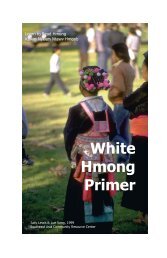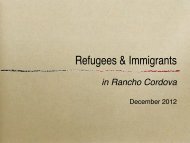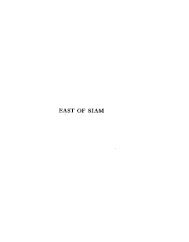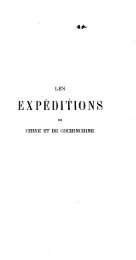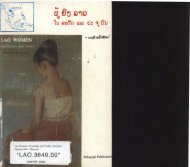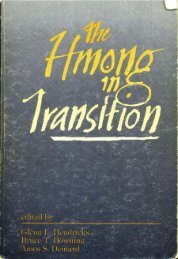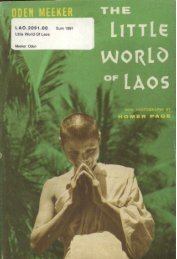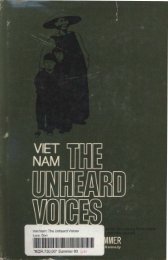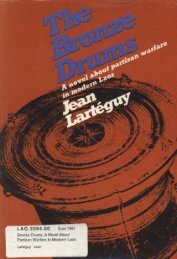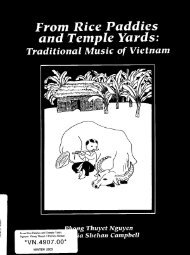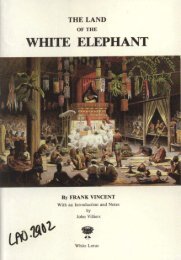PEOPLE
Grant, The Boat People - Refugee Educators' Network
Grant, The Boat People - Refugee Educators' Network
- No tags were found...
You also want an ePaper? Increase the reach of your titles
YUMPU automatically turns print PDFs into web optimized ePapers that Google loves.
The Boat Bople<br />
consider and with empire-minded Churchill in command, differed<br />
from the Americans. The decision taken by Rmsevelt, Churchill<br />
and Stalin at Potsdam in 1945 was that, on the defeat of Japan, Vietnam<br />
would be occupied below the sixteenth p~talkl by British<br />
traops and above the line by the Chinese. The British ushered back<br />
the French in the south. In the north the Chinese eventually allowed<br />
them hck also (in exchange for some privileges) but not More<br />
1 M 000 Chinese soldiers had ransacked the route into Hanoi in a<br />
manner that is still referitd to with awe. They moved through the<br />
countryside like locusts, seipping houses of even their roof-tiles and<br />
doors, and sending a shiver through the Vietnamese population<br />
which some historians believe strengthened Ho's hand.<br />
Choosing brilliantly a moment of chaos (the Japanex had added<br />
to the confusion earlier by staging a coup against the Vichy French)<br />
Ho proclaimed in Hanoi in September 1945, on kh~lf<br />
of the Victminh,<br />
the declaration of the democratic republic of Vietnam. The<br />
opening words of the declaration were: 'All men are created equal.<br />
They are endowed by their Creator with certain unalienable rights,<br />
among these arc Life, Liberty and the Pursuit of Happiness. , .' Ho'8<br />
luck, or his charm, was remarkable. As the ceremony preceded, a<br />
flight of American airaaft passed overhead. Seeing the mwd, they<br />
dipped wings to take a h e r look, so it is said - but the Vietnamese<br />
(and many French) believed that the dip was n salute.<br />
Ho's peaceful Azure of power, undcr the benevolent gaze of the<br />
victarious Americans, revived fulk memories for the Vietnamese<br />
people. This was the leader who, having the 'mandate of hcavcn',<br />
could unitc the country. It was the only place in the whole of colonial<br />
South-East Asia where leadership passed directly to the communists.<br />
Elsewhere leadership passed to the nationalists, like Sukarno, Tunku<br />
AMul Rahman and Lee Kuan Yew and the communiuts aied in subsequent<br />
years to wrench power from thcm, uneuccessfully. Ho's<br />
national leadership was now establkhed; party membership rose<br />
from 20 000 in 1946 to 168000 in 1948. In view of what was to come,<br />
which would demonstrate to the world the qualities of both Ho Chi<br />
Minh and the Vietnamese communistu, it is a linlc too easy to anributt<br />
his quick success in 1946 to a quirk of fate.<br />
Nor is it possible to suggest that, in becoming rwmmunist, Victn<br />
m simply followed China, as it had done in all other important<br />
matters. In 1945 China was four yeam away from communist rule<br />
and, while Ho followed Mao Tse-tung in the strategy of peasantsupported<br />
partisan warfare, the ricc mlture of Vietnam is different<br />
from that of China north of the Yangt~e, where grain is the staple,<br />
and even in southern China the rice culture is dflaent from Vietnam's<br />
btcause of the absence of the South-Eat-Asian monsoon.<br />
Vietnam is not China, Ho Chi Minh, in spite of his m y years<br />
abroad, remained intensely Victnamesc, with a hard-headed political<br />
approach that has reminded writers as much of Gandhi as of Mao.<br />
So txgan the lwt stage of the struggle for Vietnamw unity and<br />
indcpcndtnce for which millions hd been sacrificed in the past and<br />
for which millions would be saaificcd during the next thiq ycars.<br />
For, although a compromise agreement was signed bctween the<br />
French and Viemam, and Ho Chi Minh adopted a strategy of conciliation<br />
(even dissolving the communist party), clashes between he<br />
Vietminh and French wmp continued. In Nwcmber 1946 the<br />
French navy bombarded Huiphong, killing 6000. Ho Chi Minh<br />
returned with his govmmtnt to the jungles and the paddy field5<br />
and war with the French began. The emperor of Annam, Bao Dai,<br />
was persuaded to h d a pro-French government.<br />
With the dmth of Roosevelt and Washington's preoccupation<br />
with restoring wwem Europe, American anti-colonial sentiment<br />
became suMued. Tk cold war brought a US commitment to NATO<br />
(1949) and America'~ fint military aid to the French in Vietnam<br />
arrived the next year, Although wtgumed, the Victminh twk the<br />
offensive in rhe classical manner of gusiHa warfrrrc, controlling the<br />
rural arcas of Tonkin md Annarn and penetrating into Cochin<br />
China. The battle of Dim Bien Phu in north-west Tonkin ww decisive.<br />
After a siege of fifty-five days, on 7 May 1954, 10 000 Frtnch<br />
trqs surrendered to General Giap and the French nation was ready<br />
to negotiate.<br />
'he Geneva agraments of 1954 confirmed at an international<br />
level tht Vietnam was an inde~ndent, aovtreign state, but at the<br />
same time destroyed the unity that had been maintained since 1802.<br />
'rhc country was split along the seventeenth parallel, with the intmtion<br />
that gcntml elections in nvn yenrs timc for the entire country<br />
: wwld rcstore unity, If the elections had bren hcld, there secms little<br />
doubr that the Vietmintr would harc won handsomely. The mandate:<br />
i




